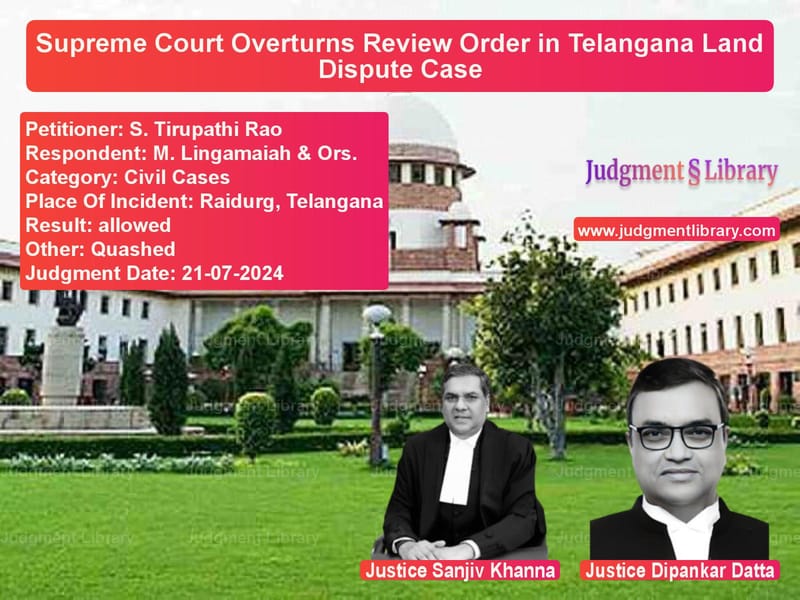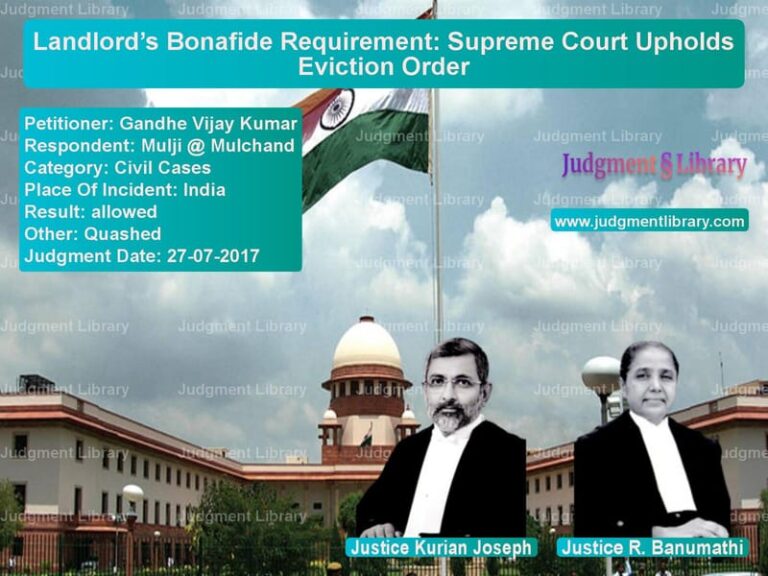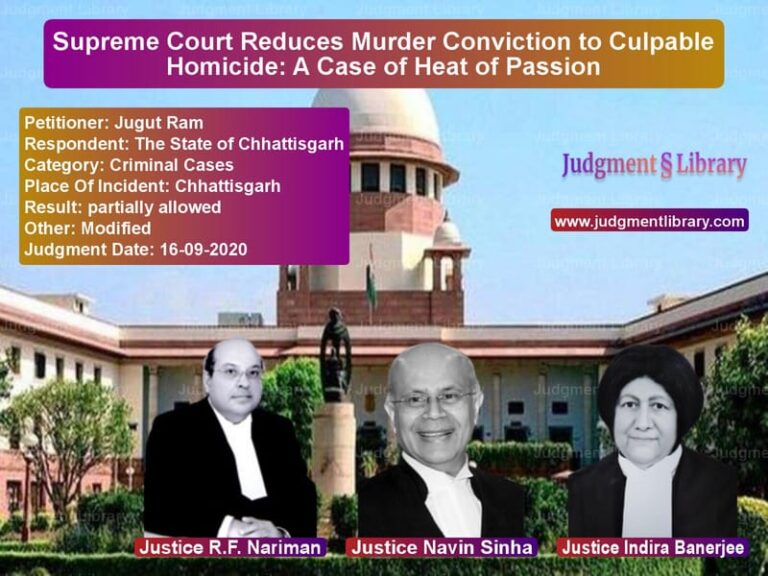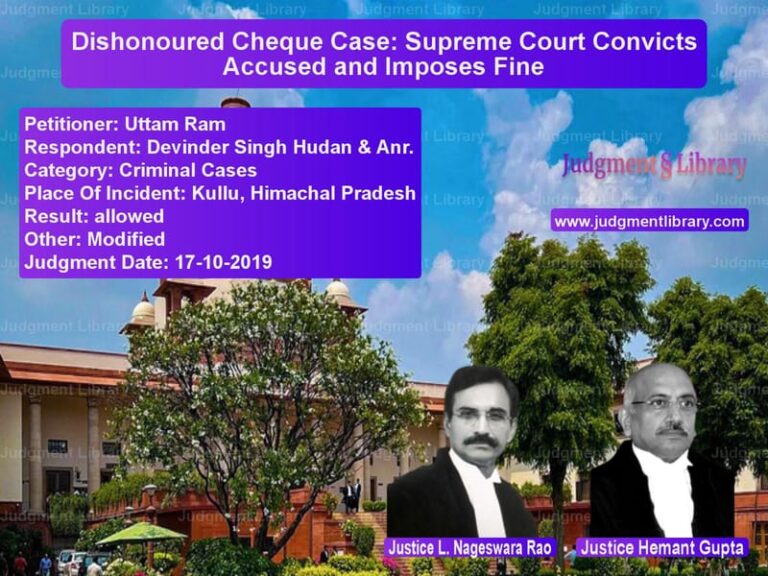Supreme Court Overturns Review Order in Telangana Land Dispute Case
The Supreme Court of India, in its judgment dated July 22, 2024, overturned a review order passed by the Telangana High Court concerning a long-standing land dispute in Raidurg village. The case, S. Tirupathi Rao vs. M. Lingamaiah & Ors., revolved around the execution of a civil decree, mutation of land records, and the imposition of contempt proceedings against the revenue authorities.
Background of the Case
The dispute originated in a partition suit filed in 1953 by Ms. Sultana Jahan Begum, daughter of Nawab Moin-ud-Dowla Bahadur, seeking division of her father’s properties, including Raidurg village. Over the decades, the matter became entangled in multiple legal battles, including revenue claims, mutation proceedings, and contempt cases against government officials.
Key Events Leading to the Dispute
- In 1959, a preliminary decree was passed based on a compromise, listing Raidurg village as part of the property.
- In 1968, the Nazim-e-Atiyat rejected claims that the land was jagir, ruling that it escheated to the government.
- The Board of Revenue affirmed this ruling in 1976, stating that the land legally belonged to the State.
- Despite this, in 2003, the civil decree holders assigned parts of the land to M. Lingamaiah, the first respondent.
- The High Court’s final decree in 2003 directed mutation of 84.30 acres in favor of Lingamaiah.
- Lingamaiah’s attempts to mutate the land in revenue records were blocked by the Tahsildar, prompting him to file a writ petition in 2009.
- In 2009, the Telangana High Court directed revenue authorities to effect the mutation.
- When the Tahsildar failed to comply, Lingamaiah filed a contempt petition in 2014.
- The Single Judge ruled in favor of Lingamaiah in 2017, ordering the mutation and imposing a two-month jail sentence on the Tahsildar.
- The State challenged the decision through a contempt appeal and a letters patent appeal.
- In 2018, a Division Bench overturned the contempt ruling, stating that the suit was withdrawn against the State, rendering the decree unenforceable.
- Lingamaiah unsuccessfully challenged this in the Supreme Court in 2018.
- After losing in the Supreme Court, Lingamaiah filed a review petition in the High Court.
- In 2022, another Division Bench allowed the review petition, reinstating the 2017 contempt ruling.
- The State then challenged this review ruling before the Supreme Court.
Supreme Court’s Observations and Ruling
1. Limits of Review Jurisdiction
The Supreme Court held that the High Court had exceeded its review jurisdiction by essentially rehearing the case:
“The power of review is not an appeal in disguise. A review is limited to errors apparent on the face of the record or the discovery of new evidence that was previously unavailable despite due diligence.”
The Court found that the review Bench improperly re-examined the entire case without any valid justification.
2. Contempt Proceedings and Limitation
The Court ruled that the contempt petition filed in 2014 was barred by limitation under Section 20 of the Contempt of Courts Act, 1971:
- The 2009 order directed mutation within two months, making May 2009 the compliance deadline.
- The contempt petition was filed in 2014—five years after the order.
- The Supreme Court emphasized that non-compliance did not constitute a “continuing wrong” and that contempt actions must be initiated within one year.
3. Fraudulent Suppression of Facts
The Supreme Court noted that Lingamaiah had suppressed critical facts, including:
- The 1968 and 1976 rulings that the land belonged to the government.
- The fact that the suit was withdrawn against the State, making the decree unenforceable against it.
The Court observed:
“A party who suppresses material facts and misleads the court is not entitled to relief. Fraud vitiates even the most solemn of proceedings.”
Final Judgment
- The Supreme Court set aside the 2022 review judgment of the Telangana High Court.
- The 2018 Division Bench ruling, which had quashed the contempt order and held the decree unenforceable against the State, was reinstated.
- All pending applications were dismissed.
- The parties were directed to approach a civil court if they sought further adjudication of property rights.
Key Takeaways
- Review is not an appeal: The Supreme Court reaffirmed that review jurisdiction is limited to correcting errors on the face of the record.
- Limitation in contempt cases: The ruling emphasized that contempt proceedings must be initiated within one year of the alleged non-compliance.
- Fraudulent litigation is unacceptable: The Court stressed that parties who suppress material facts cannot claim equitable relief.
- State land cannot be claimed through unenforceable decrees: The judgment clarified that government land cannot be transferred based on a decree where the State was not a party.
Conclusion
The Supreme Court’s ruling provides clarity on the boundaries of review jurisdiction, the importance of complying with statutory limitation periods in contempt cases, and the necessity of full disclosure in litigation. By overturning the review order, the Court reaffirmed the principle that judicial integrity must be safeguarded against attempts to re-litigate settled matters through procedural loopholes.
Petitioner Name: S. Tirupathi Rao.Respondent Name: M. Lingamaiah & Ors..Judgment By: Justice Sanjiv Khanna, Justice Dipankar Datta.Place Of Incident: Raidurg, Telangana.Judgment Date: 21-07-2024.
Don’t miss out on the full details! Download the complete judgment in PDF format below and gain valuable insights instantly!
Download Judgment: s.-tirupathi-rao-vs-m.-lingamaiah-&-ors.-supreme-court-of-india-judgment-dated-21-07-2024.pdf
Directly Download Judgment: Directly download this Judgment
See all petitions in Property Disputes
See all petitions in Contract Disputes
See all petitions in Damages and Compensation
See all petitions in Judgment by Sanjiv Khanna
See all petitions in Judgment by Dipankar Datta
See all petitions in allowed
See all petitions in Quashed
See all petitions in supreme court of India judgments July 2024
See all petitions in 2024 judgments
See all posts in Civil Cases Category
See all allowed petitions in Civil Cases Category
See all Dismissed petitions in Civil Cases Category
See all partially allowed petitions in Civil Cases Category







